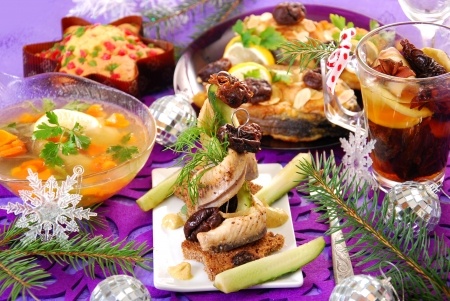

Food Safety Tips for Christmas and Holiday Entertaining
Christmas is often associated with festive parties and plenty of food. With the tendency to put food out of a table for hours while guests graze, however, food safety must be considered. Children, the elderly, people with compromised immune systems, and pregnant women are especially susceptible to the negative effects of food poisoning.
Food served at Holiday parties can be particularly vulnerable to growing bacteria:
- Pot-lucks are common during the holidays. This means that a lot of food is traveling and out of the fridge for up to several hours; allowing plenty of time for bacteria to multiply.
- Food often sits out of the fridge for hours on a table as party guests graze.
- Party food is often prepared well ahead of an event. It is important that perishable casseroles and desserts be chilled or frozen quickly after they are cooked.
Food Safety Tips for your Christmas Party
Come up with a plan that minimizes the risk of dangerous bacteria:
- Ideally, the host should prepare and cook riskier foods such as turkey so that they do not endure long periods of time at the wrong temperature.
- Ask guests who will be travelling for one hour or longer to bring non-perishable food items. If that isn’t practical, have them come early to prepare their dish in your kitchen. Warm items should be re-heated to their appropriate temperature before serving and cold items should be packed with ice in a cooler.
- Make sure that anyone preparing food in your kitchen has washed their hands and is using clean utensils and cutting boards.
Avoid the food temperature danger zone:
The food temperate danger zone is 41 degrees Fahrenheit to 140 degrees Fahrenheit; this is the range most likely to cause food borne illness at parties and functions. Work to minimize the time food stays in the temperature danger zone by keeping food hot or cold. Never keep food out for more than four hours and throw it away once four hours has passed.
- Hot food can be kept hot in the oven, on the stove top, or with a buffet food warmer.
- Keep food cold by placing in containers on top of ice or in a cooler, fridge, or freezer.
Fridge and freezer safety tips:
- Your fridge or freezer works by circulating cold air around the items inside. If your fridge or freezer are overcrowded, the temperature inside may rise as the unit works harder to stay cold.
- What should you do if your fridge/freezer is overcrowded?
- Pull out the drinks and put them in a cooler.
- Ground coffee doesn’t need to be refrigerated or frozen; take it out and store it in an airtight container.
- Put whole fruits and raw vegetables back on the counter.
- Jars of pickles and other bottled items with vinegar can be out of the fridge for a couple of days.
- If you still don’t have enough room, then be sure to keep items that will be eaten last such as desserts in the fridge while pulling out items that will be eaten first such as appetizers.
- Keep a fridge/freezer thermometer inside the unit so that you can check that the correct temperature is holding. Adjust the temperature controls as needed.
- Perishable foods such as dips and meats should remain fresh in the fridge for two to three days.
- Place raw meat and poultry covered and away from prepared foods. Raw food is more likely to house dangerous bacteria and if these bacteria spread to foods that are already ready to eat, there is no opportunity to kill them through a cooking process.
- What should you do if your fridge/freezer is overcrowded?
Store these holiday foods in the fridge:
- Cooked vegetable, pasta or rice salads, especially if they contain meat or cheese
- Cooked meats including deli and patés
- Pre-cooked seafood
- Dips
- Desserts that contain dairy or eggs
- Any dish that has raw or minimally cooked eggs, such as home-made mayonnaise or Egg-Nog
- Perishable items such as dips and soft cheeses that will be placed out for grazing should be divided up into small portions and replenished as they run out or as four hours is reached. Be sure to clean the container first before topping up.
Leftover Safety Tips:
- Refrigerate or freeze leftovers immediately after the meal and eat them within two to three days.
- If the food needs to cool, divide it into small containers so it cools more quickly.
- Throw away perishable foods that have been left out in the “danger zone” for four or more hours.
- When re-heating leftovers, ensure that they are hot all the way through.
- Bring ice packs with you so that you can transport leftovers home safely.
- Immediately put leftovers in the fridge or freezer when you return home.
If you or a loved one were injured in an accident, you have enough to deal with. Let an experienced accident attorney fight for the full compensation that you deserve. It is not uncommon to receive a settlement from the insurance company that is five to ten times bigger with the help of a lawyer. Call the caring accident attorneys at Tario & Associates, P.S. in Bellingham, WA today for a FREE consultation! We have been representing residents of Whatcom County, Skagit County, Island County and Snohomish County since 1979. You will pay nothing up front and no attorney fees at all unless we recover damages for you!




